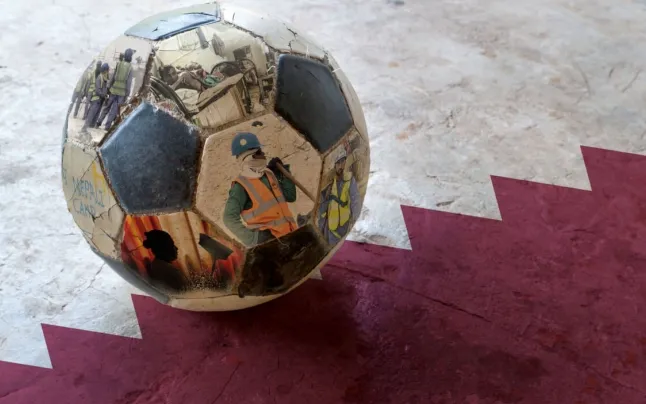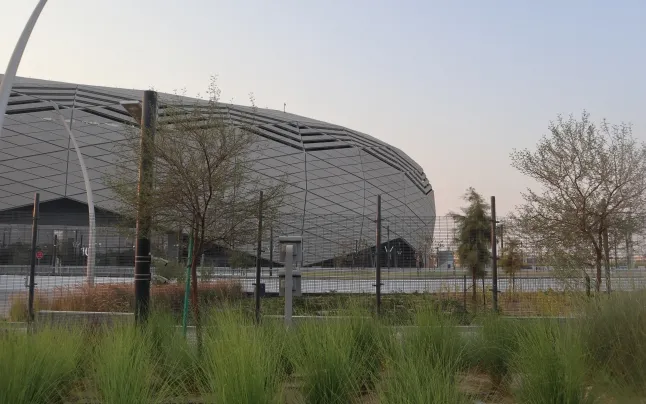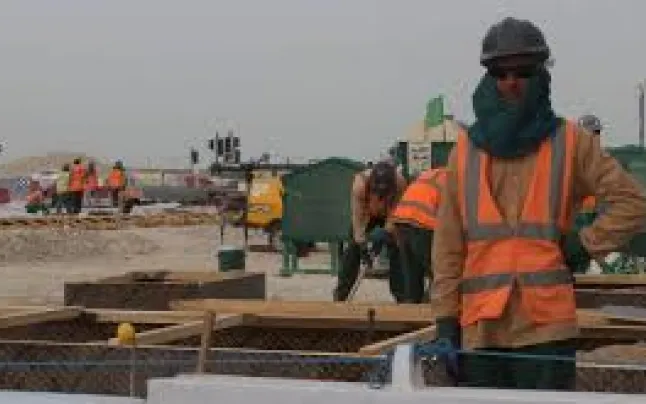Carlos de las Heras: "FIFA has looked the other way regarding the human rights situation in Qatar"
As the World Cup in Qatar begins, we talk to Amnesty International about the dark side of the sporting event that attracts the attention of half the world.
Talking about the World Cup in Qatar means talking about much more than just football. In fact, sport is just an anecdotal fact if we take into account the controversy surrounding the tournament, which is being held between November 20 and December 18 and is marked by rights violations and the deaths of workers during preparations for the event.
Today we talk about it with Carlos de las Heras, head of sports and human rights at Amnesty International (AI), one of the many organisations that has been denouncing for months the serious violations of human rights in the Middle Eastern country, which cannot remain in the background of an event with as large a following as this one.
Amnesty International has dubbed the tournament held in Qatar the 'World Cup of Shame'.
It’s a World Cup to be ashamed of because Qatar is using this huge event to offer the world a modern, open and reformist image, when the reality of human rights in the country is very worrying, especially regarding freedom of speech, the rights of women, the rights of the LGBT community and, above all, the abuses suffered by migrant workers.
The shadow of corruption has hovered over the World Cup since the very beginning, starting with a very murky nomination process by FIFA.
We don't get into whether it was a good decision or not to award the World Cup to Qatar. However, once the country was chosen, FIFA should have got to know what the situation in Qatar is. And the truth is that it hasn’t been involved enough in this issue and has looked the other way on the human rights situation in the country.
Amnesty International has been denouncing this for months.
Earlier this year we launched the #PayUpFIFA campaign, calling on FIFA to allocate $440 million to a fund to redress and compensate workers who have suffered abuses in Qatar. We set this specific amount because it’s roughly equivalent to the figure that FIFA will allocate to prizes among the teams participating in the World Cup.
The campaign has gathered a lot of support.
Yes, in three ways. First, from the fans, who in Spain alone have provided more than 18,000 signatures in favour of the petition, and also from national federations, with a dozen countries already supporting it. Among them, seven that participate in the World Cup such as Germany, France, England, the Netherlands, Denmark, Wales and the United States. And finally, even from companies that sponsor the World Cup, such as Budweiser, Adidas, McDonald's and Coca-Cola, which have shown themselves in favour of the creation of this fund.
Have athletes joined in as well?
Perhaps not specifically in favour of the campaign, but there have been statements about the human rights situation in Qatar from coaches such as the Netherlands' Louis Van Gaal or Brazil's Tite, as well as active players and coaches like Toni Kroos and Jürgen Klopp, and former footballers like Gary Lineker.
On the other hand, the president of FIFA, Gianni Infantino, has asked people to 'focus only on football'. What’s your opinion?
These are worrying statements, because if he really wants the conversation to be about football, instead of sweeping problems under the rug what he should do is to engage in gestures such as supporting the creation of this repair fund.
The issue that has drawn the most attention is that of labour abuses against workers during the construction of infrastructure for the tournament. What were these working conditions like?
There is a common message that we keep hearing in the conversations we’ve held directly with the victims and witnesses of these abuses. They talk about endless working days of up to sixteen hours with almost no rest; overcrowding of workers at work sites, non-payment of wages; the impossibility of accessing justice in cases of labour abuse or conflicts with companies; and, of course, working days outdoors with temperatures ranging from 45 to 50 degrees centigrade.
It’s difficult to know how many people may have died during all the preparations for the World Cup.
Finding out the exact number of workers that have died is impossible. And it will continue to be so until there is a full investigation into the deaths in projects related to the World Cup. However, what we can already say is that thousands of worker deaths since 2010 in the country remain unexplained. And it’s likely that many were caused by the heat and the absence of adequate health and safety measures, among other things.
"Finding out the exact number of workers that have died in Qatar in connection with the World Cup is impossible."
An investigation by the newspaper The Guardian reports 6,500 deaths.
It’s a figure that is quoted very often, but which is misinterpreted as coming from the process of building facilities for the World Cup, which is not the case, as the report itself explains. It brings together the deaths of workers from five countries, both work-related and not. That’s why at AI we don’t report this figure. In any case, we are undoubtedly talking about thousands of deaths.
Beyond this, there are other groups that suffer discrimination of all kinds in Qatar, such as, for example, women.
As in many Middle Eastern countries, in Qatar women continue to be considered second-class citizens. In part, this is because they are subject to a system of male guardianship, where they require the permission of a male guardian, which is usually the husband, father, brother or a close relative. They need this permission for matters as basic as getting married, studying abroad on government scholarships, working in certain places, travelling to other countries if they are under 25 or even accessing reproductive health care.
In addition, Qatari family law also makes it very difficult for women to obtain a divorce, and if they do, they must give up custody of their children.
The situation regarding the LGBT community is also very worrying.
It’s another one of the groups that’s persecuted in Qatar. The law discriminates against LGBT people through the criminal code, which criminalises various consensual sexual acts between people of the same sex, and establishes prison sentences of up to seven years. The authorities have taken it upon themselves to minimise this situation with messages to the effect that everyone is welcome, but that’s hard to believe.
There have been some rather uninspiring statements in this regard.
Yes, like those of a member of the organising committee, who advised people to refrain from expressing affection in public. Or those of a World Cup ambassador and ex-player from Qatar just a week ago, who stated that homosexuality is a mental deviation. And we’ve also had practical examples, such as the arrest of the British activist Peter Tatchell, who was detained for three hours for carrying out a peaceful protest wearing a t-shirt in favour of the LGBT community.
You expected more gestures from countries, federations, players...
About this, a distinction must be made. While it’s true that there have been statements by political representatives, especially from central European countries, it would be good if the authorities travelling to Qatar made some public gestures. As for athletes, gestures have been rather scarce. Yes, there have been some outside of football, such as that of driver Lewis Hamilton, who wore the rainbow flag during the Formula 1 Qatar Grand Prix.
Or the 'One Love' campaign, which urges national team captains to wear armbands with the LGBT symbol and which some national teams have already given support to.
This is not the case of Spain, which hasn’t made any gestures in this regard.
The Spanish Federation is offside in this matter. Just a few days ago its president, Luis Rubiales, made some statements during a United Nations meeting in which he said that the federation likes to go to all kinds of countries and leave some legacy there. Well, so far the only legacy left by the World Cup is the death of thousands of workers, abuses of all kinds and human rights violations.
A good way for Spain to leave a legacy would be to support the reparation fund, for example. We have asked them seven times and have never received a response.
"We call on FIFA to allocate 440 million dollars for the creation of a fund to repair and compensate the workers who have suffered abuses in Qatar."
The World Cup and other major sporting events help countries like Qatar to whitewash their image abroad. Do these events really change anything in the countries where they are held?
Based on what has happened so far, no. The strategy of whitewashing through sports is not new. We can go back to the thirties, with the World Cup in Mussolini's Italy or the 1936 Olympics in Nazi Germany. Or, more recently, the '78 World Cup in Argentina, where thousands of people celebrated Argentina's goals while political opponents of Jorge Videla's regime were being tortured and made to disappear just ten streets away, at the army's mechanics school.
What’s new is that in recent years certain countries such as those in the Middle East are diversifying their investments and using sports to do so, either by organising major sporting events or by buying clubs such as PSG, Manchester City or Newcastle.
Despite everything, Amnesty International does not advocate a boycott of the World Cup.
We don’t support a boycott and we’re not against the World Cup being held in Qatar, but we think it should be an opportunity for real change to take place in these countries and for these events to leave a legacy. If a tournament like this is held in Qatar, it should be used to talk about many things beyond football, such as the human rights situation. If this was the case, we would find it interesting.
And for future events in countries like this one, we believe that economic considerations should not be the only priority and that clauses relating to respect for human rights, for example, should be included.









Add new comment